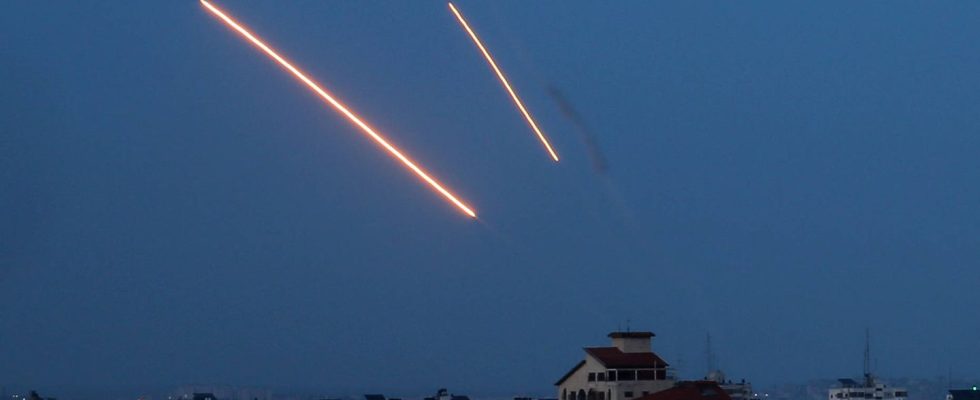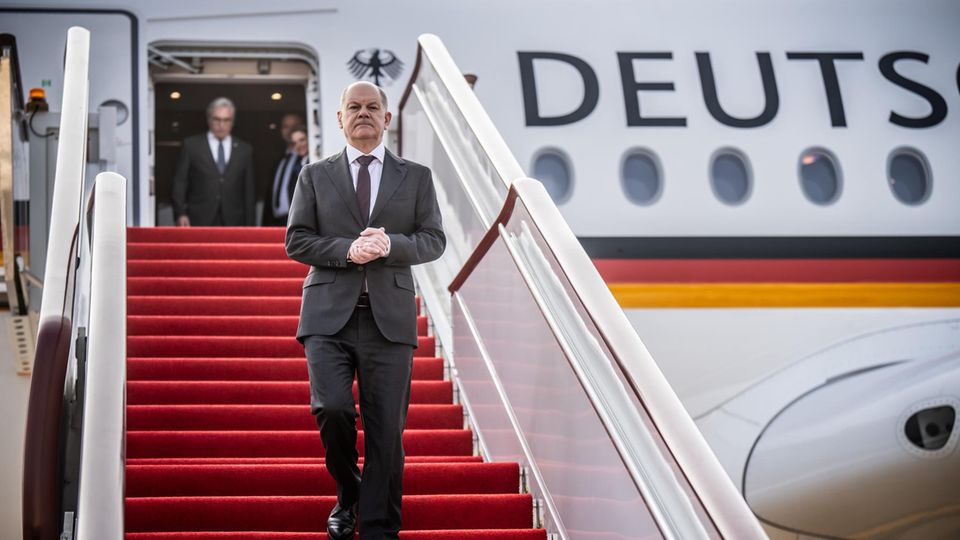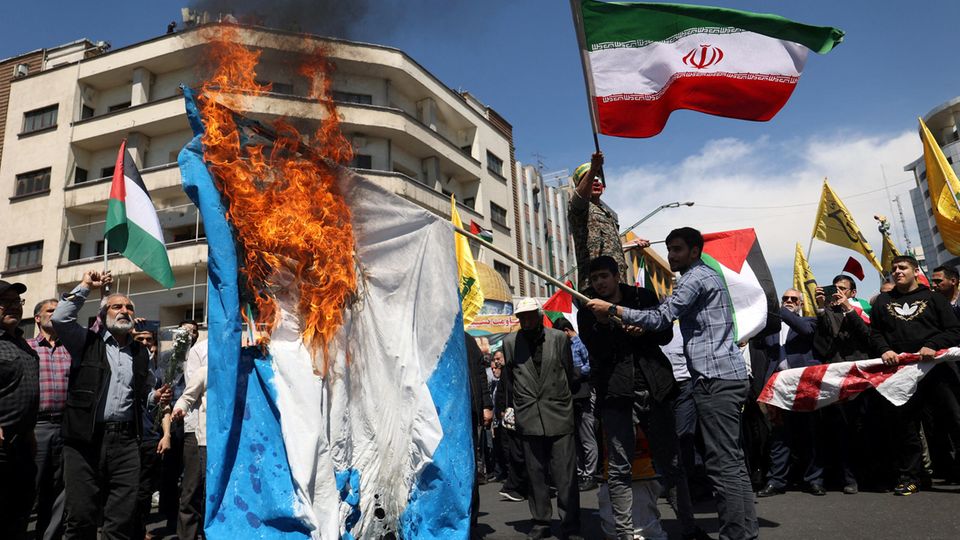For the first time in the history of the Islamic Republic, Iran directly attacked its arch-enemy Israel. The Revolutionary Guard fired hundreds of drones and missiles. The damage is minimal because Israel intercepted most of it. Nevertheless, the signs point to escalation.
Iran has made good on its threat and directly attacked Israel, its declared arch-enemy, for the first time. According to the Israeli military, Iran fired around 300 drones and missiles during the major night attack. According to Israel, around 99 percent of them were repelled. Only a small number of rockets hit Israeli territory; there were no fatalities or major damage, according to the information. The UN Security Council in New York is expected to hold a special meeting on Sunday. The Iranian retaliation for an air strike – presumably carried out by Israel – on the Iranian embassy compound in Syria’s capital Damascus two weeks ago had been expected for days.
Rocket alarms were triggered in various locations in Israel on Sunday night. According to the army, the warning sirens wailed in areas such as the south, the Dead Sea, the greater Jerusalem area and the north of the country. According to Hagari, a girl was injured. In addition, a military base in the south of the country was hit and slightly damaged. According to the White House, Israel was able to “intercept almost all incoming drones and missiles” thanks to the help of the US military. After a few hours, Israel’s homeland security finally gave the all-clear: residents in the north and south of the country no longer had to stay near shelters, they said.
In addition to Iran, Hezbollah and Houthis are also attacking
There were also attacks from Iraq and Yemen, but they did not reach Israel, the spokesman said. Dozens of rockets were fired from Lebanon into northern Israel. Nobody was injured. “Over the past six months we have worked closely with our partners, primarily Centcom of the USA, Great Britain and France and other countries that were active tonight,” explained Hagari.
In Kibbutz Snir in northern Israel near the border with Lebanon, the alarm sirens were triggered during the night, the Israeli army announced. Air alarms were also triggered in Jerusalem. Journalists on site reported explosions.
Iran’s spiritual leader, Ayatollah Ali Khamenei, threatened Israel on Wednesday with retaliation for an attack attributed to Israel on an Iranian consular building in the Syrian capital Damascus. At the beginning of April, 16 people were killed, including two generals from the Iranian Revolutionary Guard.
Iran: “Operation has achieved all its objectives” – warning to Israel
Iran claims to have achieved all of its goals by attacking Israel with drones and missiles. Army chief Mohammed Bagheri said on Iranian television on Sunday: “Operation ‘Honest Promise’ was carried out successfully between last night and this morning and achieved all of its objectives.” Iran fired more than 300 drones and missiles at Israel during the night, almost all of which were intercepted.
According to the Iranian army chief, no civilian targets or cities were targeted by the Iranian missiles. There were two main targets: the intelligence center that provided the information for the attack on the Iranian consulate building in Damascus, Syria, and the Nevatim military base from which the F35 fighter jets that bombed it took off. “These two centers have suffered significant damage and have been put out of commission.” Israel had assured that the Nevatim base had been slightly hit but was still functioning.
Bagheri also warned Israel of a counterstrike: “We have no intention of continuing the operation, but if the Zionist regime takes any action against the Islamic Republic of Iran – whether that is on our soil or against our centers in Syria or elsewhere – then ours would be “The next mission will certainly be more important than this one,” he emphasized.
The general said Iran had also sent a message to the US that its military bases were “not safe” if the US cooperated with Israel in any future action. The USA has a number of military bases in the region.
Biden calls Netanyahu on the phone
US President Joe Biden spoke on the phone to Israeli Prime Minister Benjamin Netanyahu that night. As the Israeli government announced early on Sunday morning, the two spoke after consultations with the Israeli Security Cabinet and the War Cabinet. The White House subsequently said Biden condemned the Iranian attack “in the strongest possible terms” and reaffirmed the US’s “iron-clad commitment” to Israel’s security. Biden announced a meeting of the G7 group of economically strong democracies this Sunday. He will convene G7 leaders “to coordinate a joint diplomatic response to Iran’s brazen attack.”
The US President said that US forces or facilities were not affected by the Iranian attacks. But we will continue to be vigilant against all threats. The US broadcaster CNN reported, citing a senior government official, that Biden told Netanyahu in the phone call that the US would not take part in “offensive operations against Iran” regardless of its military contribution to Israel’s self-defense.
Iran warns the USA
Two brigadier generals were killed in the air strike on the Iranian embassy compound in the Syrian capital Damascus on April 1st. Iran portrayed the operation called “Sincere Promise” as appropriate retaliation and warned Israel of a new retaliation. “The matter can be considered closed. However, if the Israeli regime makes another mistake, Iran’s reaction will be much harsher,” the Iranian mission to the United Nations said on Platform X on Saturday (local time).
Iran’s Revolutionary Guard also sent a sharp threat to the USA. “Any support and involvement in harming Iran’s interests” will result in a “decisive response from the armed forces of the Islamic Republic of Iran,” said a statement read on state television on Sunday night.
Is Israel responding with a counterattack?
It was initially unclear whether Israel would respond to the massive Iranian retaliation with a counterattack. The security cabinet has authorized Netanyahu as well as Benny Gantz, Minister in the War Cabinet, and Defense Minister Joav Galant to make decisions about how to proceed, reported the Channel 12 television station. Israel’s Chief of General Staff Herzi Halevi is conducting a situation assessment at the Air Force operations center, the military said in the night with. “A direct Iranian attack will require an appropriate Israeli response against Iran,” Galant warned on Friday. US Defense Secretary Lloyd J. Austin once again assured Galant of the United States’ unwavering support on Sunday night, the Pentagon announced.
Scholz strongly condemns Iran’s attack
Chancellor Olaf Scholz condemned the Iranian attacks on Israel “strongly.” “With this irresponsible and unjustifiable attack, Iran is risking a regional conflagration,” said government spokesman Steffen Hebestreit on his behalf after the Chancellor’s arrival in China on Sunday. “In these difficult times, Germany stands closely by Israel’s side. We will now discuss further reactions closely with our G7 partners and allies.”
UN Secretary General warns of escalation
UN Secretary-General António Guterres also emphasized the risk of a catastrophic deterioration of the situation in the Middle East. “I am deeply concerned about the very real threat of devastating escalation across the region,” he said in New York. He condemned Iran’s attack “in the strongest possible terms” and called for an immediate cessation of hostilities. EU chief diplomat Josep Borrell wrote on X: “This is an unprecedented escalation and a serious threat to regional security.”
Egypt is also extremely concerned
Egypt had previously also expressed “extreme concern” about the Iranian attack on its neighboring country and called for extreme restraint. The attack announced by Iran is a sign of a “dangerous escalation” between the two countries, the Egyptian Foreign Ministry said on Saturday evening. Egypt had previously warned of an expansion of the conflict as a result of “Israel’s war in the Gaza Strip.” The government in Cairo is in constant contact with all parties involved to stop the escalation, it said. Egypt was the first Arab country to make peace with Israel in 1979.
London is sending additional fighter jets to the Middle East
Israeli Prime Minister Netanyahu addressed his country’s citizens shortly before the Iranian attack. “The State of Israel is strong. The IDF (Israel’s Armed Forces) is strong. We appreciate the US standing with Israel, as well as the support of Britain, France and many other countries,” he said. “We have a clear principle: whoever harms us, we harm them too.”
Meanwhile, Britain is sending more fighter jets to the region in response to Iran’s attacks, Defense Secretary Grant Shapps announced. “These jets will intercept any air strikes within the range of our existing missions if necessary,” it said.
Note: The article has been updated several times.



